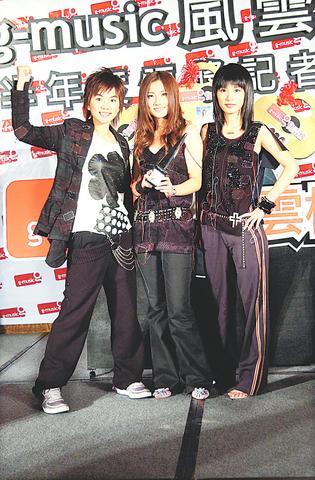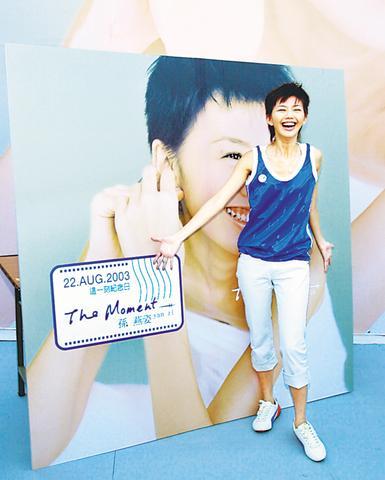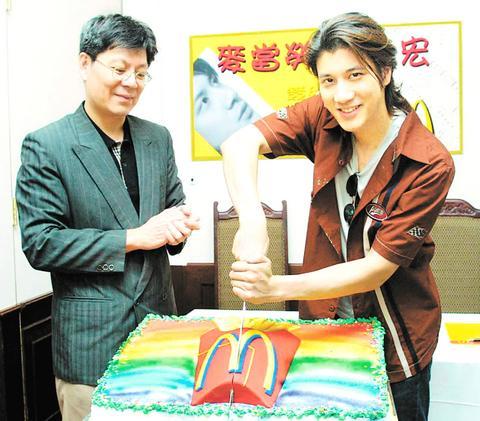It's no secret that Hong Kong singer/actress Anita Mui (梅艷芳) has had some health problems of late, but Next Magazine (壹週刊) seems to be wandering onto thin legal ice in its latest issue by announcing that Mui is suffering from cervical cancer.
Mui has tried to silence the reports in the Hong Kong media about her health problems, to no avail, and threatened to sue anyone who writes erroneous stories on the subject. Never one to fear a lawsuit, Next references unnamed sources to back its claim that Mui has come down with the deadly disease. As evidence, the report says her family allegedly has been burning a lot of ghost money and carrying out various prayer rituals. Also, she's wearing black-bead bracelets that carry religious significance, and spent a night in hospital two weeks ago, where she received numerous mid-night hospital visits from famous friends like William So (蘇永康) and Nicholas Tse (謝霆鋒).

Mui said, however, that her hospital stay was not to treat anything as serious as the tabloids were suggesting. But so far, she hasn't clearly stated what ailment she is suffering from. The ominous element in the story is the fact that her sister died of cervical cancer three years ago at the age of 41.

Leaving the serious stuff behind and diving into the inane news that Pop Stop enjoys most, the gloves have come off and the claws are out in the battle between Sun Yanzi (孫燕姿) fans and S.H.E. fans after the g-music billboard chart was released last week. The chart showed that Yanzi had edged out the cutesy trio of Selina (S), Hebe (H) and Ella (E) to grab first place in sales and since then S.H.E. fans have been going for the jugular in online chat rooms. In the first week of its release on Aug. 22, Yanzi's album The Moment sold over 250,000 copies, just a few thousand more than S.H.E.
Selina and Hebe may have fed the flames of their fans' ire by telling media after the results came out that no matter what the chart says, "S.H.E.'s album will always be number one in our hearts and in the hearts of our fans."

The messages posted by rabid fans were so vitriolic, top executives for Yanzi and S.H.E.'s respective record labels tried to urge restraint from fans and praised their competitors. The calls for harmony are nice, but Pop Stop is really hoping for a rumble in Hsimenting between the two camps.

Leaving the pettiness of Taiwan teenie bopper fans behind, doe-eyed singer Jolin Tsai (蔡依林) took her show to Las Vegas, of all places, for a one-off concert last weekend at the Mandalay Bay resort and casino. It's not certain how many Chinese music fans made the trek to Las Vegas for the show, but she probably doesn't care, the one-hour show earned her a cool NT$2.5 million.
Also earning a quick American buck recently is Lee Hom Wang (王力宏), who signed up with McDonald's for the company's new international ad campaign. Lee Hom will be the voice in Chinese-speaking areas for the four-minute ditty composed by McDonald's headquarters. Just for recording the song, Lee Hom is reportedly raking in over seven figures, albeit in NT dollars.
Lee Hom will be performing in Taipei on Oct. 11 so if you haven't seen the ad on TV by then, you can probably hear the song at the show.
If we're to believe the Liberty Times (自由時報), the past week has seen an invasion of foreign stars looking to run off with Taiwanese people's money.
"If Taiwan's entertainment industry can't improve itself and create a larger space for the arts, then sooner or later, foreign artists will run away with our money," said the paper's column "Scissors" (剪刀) in its edition last Thursday. The column followed up on Tuesday in a piece titled "Korean stars aren't gods" by pillorying Korean TV star Han Jae-seok (韓在石) for failing to show up at a press conference. According to the column, the actor, who was reported to have had to attend an urgent meeting at the time, was not showing the proper respect to the Taiwanese press.
Pop Stop will be curious to see if "Scissors" has anything to say about Japanese E-cup porn star Asakawa Ran coming to Taiwan to launch a new career. Whatever she does, it won't be porn, because that's illegal here, and anyway, the market was cornered by that Taiwan Plumber (台灣水電工) movie that's all over the Web.

Oct. 27 to Nov. 2 Over a breakfast of soymilk and fried dough costing less than NT$400, seven officials and engineers agreed on a NT$400 million plan — unaware that it would mark the beginning of Taiwan’s semiconductor empire. It was a cold February morning in 1974. Gathered at the unassuming shop were Economics minister Sun Yun-hsuan (孫運璿), director-general of Transportation and Communications Kao Yu-shu (高玉樹), Industrial Technology Research Institute (ITRI) president Wang Chao-chen (王兆振), Telecommunications Laboratories director Kang Pao-huang (康寶煌), Executive Yuan secretary-general Fei Hua (費驊), director-general of Telecommunications Fang Hsien-chi (方賢齊) and Radio Corporation of America (RCA) Laboratories director Pan
The consensus on the Chinese Nationalist Party (KMT) chair race is that Cheng Li-wun (鄭麗文) ran a populist, ideological back-to-basics campaign and soundly defeated former Taipei mayor Hau Lung-bin (郝龍斌), the candidate backed by the big institutional players. Cheng tapped into a wave of popular enthusiasm within the KMT, while the institutional players’ get-out-the-vote abilities fell flat, suggesting their power has weakened significantly. Yet, a closer look at the race paints a more complicated picture, raising questions about some analysts’ conclusions, including my own. TURNOUT Here is a surprising statistic: Turnout was 130,678, or 39.46 percent of the 331,145 eligible party

The classic warmth of a good old-fashioned izakaya beckons you in, all cozy nooks and dark wood finishes, as tables order a third round and waiters sling tapas-sized bites and assorted — sometimes unidentifiable — skewered meats. But there’s a romantic hush about this Ximending (西門町) hotspot, with cocktails savored, plating elegant and never rushed and daters and diners lit by candlelight and chandelier. Each chair is mismatched and the assorted tables appear to be the fanciest picks from a nearby flea market. A naked sewing mannequin stands in a dimly lit corner, adorned with antique mirrors and draped foliage

The election of Cheng Li-wun (鄭麗文) as chair of the Chinese Nationalist Party (KMT) marked a triumphant return of pride in the “Chinese” in the party name. Cheng wants Taiwanese to be proud to call themselves Chinese again. The unambiguous winner was a return to the KMT ideology that formed in the early 2000s under then chairman Lien Chan (連戰) and president Ma Ying-jeou (馬英九) put into practice as far as he could, until ultimately thwarted by hundreds of thousands of protestors thronging the streets in what became known as the Sunflower movement in 2014. Cheng is an unambiguous Chinese ethnonationalist,